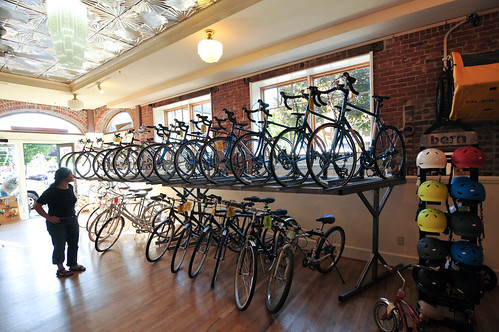
(Photo by J. Maus/BikePortland)
Should advocates for bicycling consider retail bike shops as something more than just a place to hang out and buy stuff? What if we thought of them as being so imperative to the cycling revolution that we fought for them and promoted them with as much urgency and fervor as a major piece of new bike infrastructure?
That idea was pitched by Fred Clements on BicycleRetailer.com earlier this month. As the executive director of the National Bicycle Dealers Association, Clements is far from an unbiased source. Even so, I thought his idea deserved more attention. And not just because I personally love local bike shops (like, really, love them) but because Portland’s bike shop ecosystem is in a constant state of flux and Clements’ perspective might be worth keeping in mind as we watch it evolve.
Here’s the gist of Clements’ argument (emphasis mine):
“When those in the bike world think of cycling infrastructure, they usually think of places to ride. Bike paths, bike friendly roads and off-road trails are all part of the necessary network for riding a bicycle.
But there is more to infrastructure than asphalt, concrete and off-road trails. Many bicycle dealers are becoming increasingly vocal that they are infrastructure too, and that a robust future for cycling in America revolves around bike shops.
The dictionary describes infrastructure as the “underlying base or foundation for an organization or system.” By that definition, bike shops can definitely be considered as infrastructure. It’s a rare cyclist who hasn’t taken advantage of a bike shop sometime in their life for bikes, accessories, test rides, repair, service and advice.
Bike shops as infrastructure is more than mere semantics. If bike shops are infrastructure, the fight for the future of the independent dealer becomes more than a marketplace issue. If bike shops are infrastructure, the continued decline in the number of bike shops across the country is every bicycle advocate’s problem.
…
The local bike shop is fighting for its collective life versus Internet competition and the various other manifestations of the digital age. This fight is somewhat under-the-radar of many involved in bicycle advocacy because it is in the realm of free enterprise. Advocates are used to allowing the marketplace to determine winners and losers. It may now be time to choose sides.”
I recommend reading the entire piece.
One thing that strikes me about this argument is that for many years bike advocacy groups have been clamoring for bike shop owners to do more to support their work — now we have shops arguing in the other direction.
“The health and vitality of the independent bike shop is a key for future growth. The dealer’s fight is every bicycle advocate’s fight.”
— Fred Clements, NBDA
Here in Portland we’ve got what many people think is an over-saturated market when it comes to bike shops. At last count, there were about 80 bike shops in the Portland metro region — and no decline in sight. “There are so many shops!” is something I hear a lot, especially from shop owners who tell me the recent proliferation of small, “subsistence shops” is cannibalizing customers and profits from larger, more established ones.
There’s some evidence that supports this: Back in July, two of our largest bike shops: Bike ‘N Hike and Performance, closed their Portland locations. Another bike shop just over the West Hills from downtown Portland, Sunset Cycles, will call it quits at the end of October.
While these established shops have closed, many smaller shops have expanded in recent months. The Bike Commuter in Sellwood, Portland Bicycle Studio in northwest, The eBike Store near Peninsula Park, Gladys Bikes on Alberta, and Upcycles in Woodlawn have all recently moved into larger spaces. And we’ve seen no slowdown in openings of new shops like Cat Six and Hi-5 Bikes.
Portland bike shops are extremely diverse and the impact of the Internet on their bottom line can be hard to quantify. We have very well-established online retailers with large brick-and-mortar locations (like Western Bikeworks and Universal Cycles) and we have a more traditional bike shop, Bike Gallery, that offers an “online catalog.” And then there are dozens of other permutations: from a tavern and community event space (Velo Cult), to a tiny, service-focused business located in an old school bus (Black Bird Bicycle Repair).
All our shops offer something distinctive and they all play an important in making bicycling better in Portland. While I don’t feel our shop scene mimics national trends, I’ll keep Clements’ argument in mind as our local landscape continues to change.
What do you think? I’d especially love to hear from professional advocates and shop employees.

